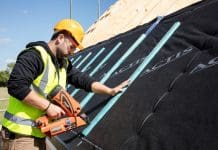This year’s CIBSE Technical Symposium was dominated by climate change, with the expected impact and strategies to cope at the forefront of discussions
More than 50 world thought speakers gathered at Loughborough University for the 2017 CIBSE Technical Symposium on 6 April 2017. The Chartered Institution of Building Services Engineers (CIBSE) is one of the largest professional bodies that deal with the structural design of buildings and energy efficiency. The theme for this year was delivering resilient high-performance buildings. Arguably the greatest threat to buildings in the future is predicted to come from extremes in climate variation, and the severity and frequency of extreme weather events. Additionally, as energy supply networks adapt to changing sources of energy, energy efficiency is becoming increasingly important to save dwindling natural resources. CIBSE estimate that 50% of damaging carbon emissions are as a result of buildings. As such they provide a significant sector to make savings.
London: A key case study
Case studies on big European cities such as London were included, to show how predicted changes in climate would affect buildings and how energy requirements could change. Data on building composition is heavily used in the planning stage of new energy efficiency measures. The conference also highlighted the need for greater use of building data in the development of more climate adaptable buildings. Case studies from the Middle East and Africa were also drawn upon.
Climate Change is being felt throughout the world
John Field CEng FCIBSE, President of CIBSE explained: “With the impact of climate change already being felt around the world, the crucial decisions about how we adapt the way we live and work to meet new challenges are being made now. Through forums like the Technical Symposium some of the industry’s top experts can come together and share knowledge and best practice, to ensure buildings are future-proof and sustainable”.












![[VIDEO] UK-based firm reveals ‘world’s first’ fully AI-driven architectural project Studio Tim Fu has revealed the 'world's first' fully AI-driven architectural project in Slovenia, developing six luxury villas on the Lake Bled Estate](https://www.pbctoday.co.uk/news/wp-content/uploads/2025/03/Interior-1-studio-tim-fu-218x150.gif)
